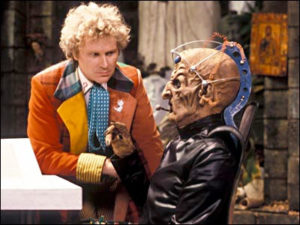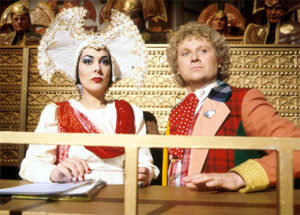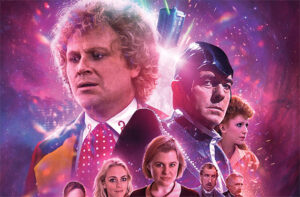Doctor Who In Perspective 1984-1986 (Part 2)
John Hussey continues his Classic look back on the Colin Baker era.

“There’s nothing you can do to prevent the catharsis of spurious morality!”
The Sixth Doctor’s era incorporated a lot of dark themes within its narratives, aided greatly by the diabolical creatures that occupied them. Season Twenty-Two in particular went about establishing some gruesome ideas (similar to the style Robert Holmes and Philip Hinchcliffe went for) which were centred on the idea of humanoid experiments. The Cybermen were brought back and fitted in nicely here because of their background as cybernetic creatures released from emotions. This time round their terror came through their intentions of re-writing history by reversing the events of ‘The Tenth Planet’. Their appearance within this serial was well remembered for their onslaught and of course their torturing of Lytton, whom had his hands physically crushed and seen bleeding onscreen.
 ‘Vengeance on Varos’ even went as far as having its narrative revolved around torture, featuring twisted entertainment that ended in grisly deaths. This was added by Sil, a despicable character that glorified in the suffering of others for his own enjoyment. His return in ‘The Trial of a Time Lord’ continued the concepts of human experiments in which they were grafted to animal cells to create new life-forms. This was taken further by the attempts of Crozier to transplant Kiv’s mind into the perfect body. The serial had the unsettling scene (later proven false) of Peri’s head being shaved and then possessed by Kiv.
‘Vengeance on Varos’ even went as far as having its narrative revolved around torture, featuring twisted entertainment that ended in grisly deaths. This was added by Sil, a despicable character that glorified in the suffering of others for his own enjoyment. His return in ‘The Trial of a Time Lord’ continued the concepts of human experiments in which they were grafted to animal cells to create new life-forms. This was taken further by the attempts of Crozier to transplant Kiv’s mind into the perfect body. The serial had the unsettling scene (later proven false) of Peri’s head being shaved and then possessed by Kiv.
The Borad (though unpopular) was an intriguing enemy and I found his design to be impressive. His drive was disturbing and his threat of turning Peri into one of his own kind (a failed mutant) was downright creepy.
 The Daleks were the best example of how gothic this era could be. Davros’ insanity rose to new heights within ‘Revelation of the Daleks’ through his experiments of turning humans into Daleks. The scene with Stengos was chilling (especially with the addition of the incidental music) and it showed how graphic the production team were willing to go. The death count was another testament to this idea, especially how unpredicted and unnecessary they were. Davros went as far as manipulating a character (Tasambeker) to kill her own boss Jobel in order to prove her loyalty, with the promise of turning her into a Dalek. After she killed Jobel she was then killed by Daleks.
The Daleks were the best example of how gothic this era could be. Davros’ insanity rose to new heights within ‘Revelation of the Daleks’ through his experiments of turning humans into Daleks. The scene with Stengos was chilling (especially with the addition of the incidental music) and it showed how graphic the production team were willing to go. The death count was another testament to this idea, especially how unpredicted and unnecessary they were. Davros went as far as manipulating a character (Tasambeker) to kill her own boss Jobel in order to prove her loyalty, with the promise of turning her into a Dalek. After she killed Jobel she was then killed by Daleks.
 The return of the Sontarans brought another attempt for their empire to claim the power of time through kidnapping the Second Doctor in order to experiment on him. This even led to him being briefly turned into an Androgum, to which began affecting the Sixth Doctor. Though the Sontarans ended up being double-crossed and pushed to the sideline, ‘The Two Doctors’ serves as my favourite Sontaran story because of their strong militaristic portrayal. They often came across as threatening as well as being very interactive with the two separate Doctors (granting Group Marshal Stike a lot of character).
The return of the Sontarans brought another attempt for their empire to claim the power of time through kidnapping the Second Doctor in order to experiment on him. This even led to him being briefly turned into an Androgum, to which began affecting the Sixth Doctor. Though the Sontarans ended up being double-crossed and pushed to the sideline, ‘The Two Doctors’ serves as my favourite Sontaran story because of their strong militaristic portrayal. They often came across as threatening as well as being very interactive with the two separate Doctors (granting Group Marshal Stike a lot of character).
 I can’t honestly say I fully enjoy the Rani’s character (mainly due to her coming across as a female Master wannabe). Nevertheless I do find her abilities within chemistry to be a new spin and contrasts against the Master being the Doctor’s intellectual equal. The Rani stands on her own in that department. She was ruthless and completely sinister due to her unemotional response of using her innocent victims to further her research. Even though the Rani didn’t intend of conquest her motives appear even more evil because it is for simple experiments without purpose other than furthering her own destructive ego. It was fun to see both the Master and the Rani tag-team the Sixth Doctor, certainly pushing the Time Lord throughout the serial (‘The Mark of the Rani’).
I can’t honestly say I fully enjoy the Rani’s character (mainly due to her coming across as a female Master wannabe). Nevertheless I do find her abilities within chemistry to be a new spin and contrasts against the Master being the Doctor’s intellectual equal. The Rani stands on her own in that department. She was ruthless and completely sinister due to her unemotional response of using her innocent victims to further her research. Even though the Rani didn’t intend of conquest her motives appear even more evil because it is for simple experiments without purpose other than furthering her own destructive ego. It was fun to see both the Master and the Rani tag-team the Sixth Doctor, certainly pushing the Time Lord throughout the serial (‘The Mark of the Rani’).
The Master didn’t really find his place within this era unfortunately and merely served as an almost afterthought/or add-on to the plots he was in. He didn’t stand out like he did within the Fifth Doctor’s era and Anthony Ainley started to lose his appeal due to him being best suited against Peter Davison. Having said that, Ainley still gave a good performance and even tried aiding the Sixth Doctor during ‘The Trial of a Time Lord’ before quickly trying to backstab him. It was interesting to see the Master become defensive towards the Doctor due to believing him to be his ultimate kill and didn’t like the idea of someone else taking that victory from him.
 The best outcome from this era was the introduction of the Valeyard. It was a brilliant idea from Robert Holmes to have him revealed as an embodiment of the Doctor’s evil. This revelation made the trial all the more understandable because the Valeyard was using it to try and claim the Doctor’s remaining regenerations (promised to him by the High Council of Gallifrey). To the Sixth Doctor’s suspicions, the Valeyard had indeed been interfering with the evidence shown throughout the trial in order to swing the verdict in his favour.
The best outcome from this era was the introduction of the Valeyard. It was a brilliant idea from Robert Holmes to have him revealed as an embodiment of the Doctor’s evil. This revelation made the trial all the more understandable because the Valeyard was using it to try and claim the Doctor’s remaining regenerations (promised to him by the High Council of Gallifrey). To the Sixth Doctor’s suspicions, the Valeyard had indeed been interfering with the evidence shown throughout the trial in order to swing the verdict in his favour.
It’s disappointing that the Valeyard hasn’t returned onscreen (though he has been mentioned) because he was a great concept and granted a twist that even shocked the Doctor because he was facing his own evil. It just showed that our hero isn’t without his faults and that his negative side (though suppressed) can become his greatest enemy.
“In all my travelling throughout the universe I have battled against evil, against power mad conspirators. I should have stayed here. The oldest civilisation: decadent, degenerate, and rotten to the core. Power mad conspirators, Daleks, Sontarans… Cybermen, they’re still in the nursery compared to us. Ten million years of absolute power. That’s what it takes to be really corrupt.”
 The direction this era took was brave because it went against what we, as fans, had come to understand about our favourite protagonist and the show itself. The Sixth Doctor became an unlikable character, returning to his roots. The First Doctor, back in his original three serials, was a rather selfish person that didn’t take kindly to meddling companions. Through his companions Ian Chesterton and Barbara Wright he mellowed into the kind soul we know and love today (though the Twelfth Doctor is still questionable). His regeneration within ‘The Caves of Androzani’ shock things up and took him away from the honourable, dashing hero back to his primal routes and this, to me, was great development for the Doctor because we saw something a little different.
The direction this era took was brave because it went against what we, as fans, had come to understand about our favourite protagonist and the show itself. The Sixth Doctor became an unlikable character, returning to his roots. The First Doctor, back in his original three serials, was a rather selfish person that didn’t take kindly to meddling companions. Through his companions Ian Chesterton and Barbara Wright he mellowed into the kind soul we know and love today (though the Twelfth Doctor is still questionable). His regeneration within ‘The Caves of Androzani’ shock things up and took him away from the honourable, dashing hero back to his primal routes and this, to me, was great development for the Doctor because we saw something a little different.
The Sixth Doctor’s challenging nature was a great experiment and showed off his alien qualities in a new way that came across as both unsettling and intriguing. We saw yet another different side to his two hearts: a massive ego. As stated in the previous article, Peri’s journey was also exciting to watch because she had only recently met the Fifth Doctor and was now thrown into the deep end by the arrival of the Sixth Doctor’s complete contrast in nature. The grittier realism that the production team added was inspiring and pushed the show’s boundaries, redesigning its essence.
The Sixth Doctor balanced out well between uncaring and heroic, brought about by his long development after his stressful regeneration. His character distastes the suffering of others, shown greatly within his latter adventures (particularly when Davros explained his schemes of turning people into protein and having Natasha and Grigory killed, to which he responded “Do you never do anything but kill?”).
 One of the Sixth Doctor’s triumphs was his legendary speech to his fellow Time Lords (see quote above) in which he questioned the danger of his greatest enemies compared to the corruptness of his own kind. The dark scenarios within this era took the Sixth Doctor to some unsettling places and I found this direction to be a fantastic idea that was sadly mistreated by superiors within the BBC.
One of the Sixth Doctor’s triumphs was his legendary speech to his fellow Time Lords (see quote above) in which he questioned the danger of his greatest enemies compared to the corruptness of his own kind. The dark scenarios within this era took the Sixth Doctor to some unsettling places and I found this direction to be a fantastic idea that was sadly mistreated by superiors within the BBC.
Of course the tragic part about this era was that it was incomplete. John Nathan-Turner and Eric Saward planned on developing the Sixth Doctor from his erratic, egotistic behaviour towards a more heroic character but this was cut short by the BBC’s Michael Grade (the Doctor’s actual greatest enemy) and his irrational beliefs. Having studied Media during my college years I know that Grade was going against the BBC’s own charter (in which they have to cater to everyone due to the TV Licence) due to him trying to exterminate Doctor Who because of his lack of interest within science-fiction. Along with this he simply didn’t like Colin Baker. The show was tragically removed from the air and went in hiatus, destroying the original planned Season Twenty-Three which would have had Sil teaming up with the Ice Warriors, the return of the Tractators (first seen in ‘Frontios’) and the Autons invading Singapore.
 The design of ‘The Trial of a Time Lord’, the new Season Twenty-Three upon the show’s return eighteen months later, reflected the then current situation Doctor Who was in which showcased them on trial for its very continuation. The production team also incorporated the themes from Charles Dickens ‘A Christmas Carol’ in which separated the fourteen part serial into four segments with the first three settings spanning from the Doctor’s past, present and future which was showcased through the Sixth Doctor’s evidence.
The design of ‘The Trial of a Time Lord’, the new Season Twenty-Three upon the show’s return eighteen months later, reflected the then current situation Doctor Who was in which showcased them on trial for its very continuation. The production team also incorporated the themes from Charles Dickens ‘A Christmas Carol’ in which separated the fourteen part serial into four segments with the first three settings spanning from the Doctor’s past, present and future which was showcased through the Sixth Doctor’s evidence.
As stated previously, we had the revelation of the Doctor having a new enemy in the form of his manifested dark nature under the persona Valeyard. Though it hasn’t been touched upon since (as of yet) this change within the mythology added greatly to the progressive narrative of the show and began its journey of making the character darker and more mysterious, challenging the viewer’s trust within the protagonist.
Despite ‘The Trial of a Time Lord’ trying something different the damage had already been done by Grade. The show had been cut down to fourteen episodes (twenty-five minutes in length each) which meant the serial count was shorter than it had ever been before, giving the writers less creative space to develop the show. The final blow was made at the Doctor himself as his sixth incarnation’s final words would be ‘carrot juice’ after disappearing into the TARDIS and dematerialising.









